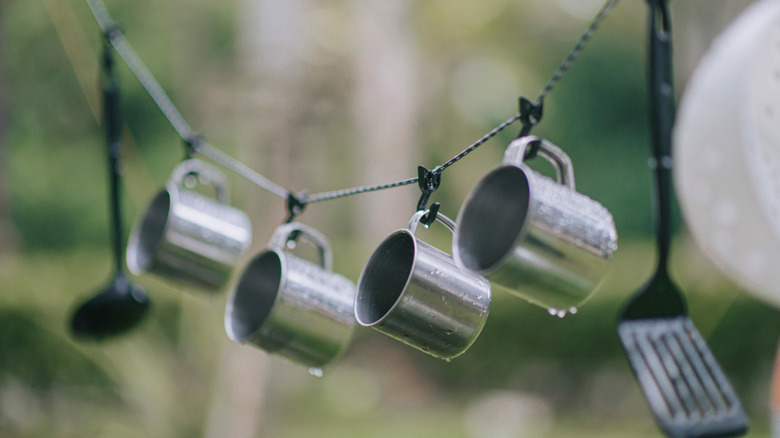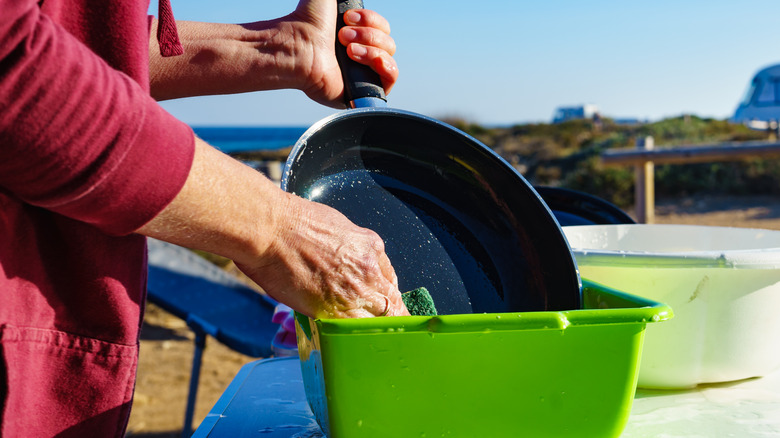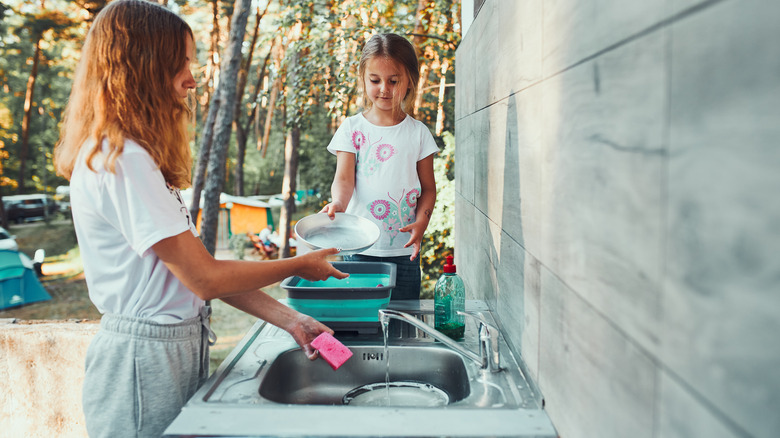Travel Guides Outdoor Adventures Camping
Amanda Morgan
Washing dishes certainly isn’t one of the most picturesque parts of embarking on an epic camping trip. Whether setting up camp in an established campground or adventuring into the backcountry on a multi-day adventure, you’re probably looking forward to preparing delicious meals around a campfire for your friends and loved ones. Your washing-up process is going to be crucial to ensuring that your camp stays healthy and neat.
Keeping a clean and hygienic camp is imperative, especially if you’re cooking multiple meals. Eating off of dirty dishes as well as cooking with them can have all sorts of negative consequences — from attracting unwanted animal visitors to contracting food-borne illnesses. Bacteria that cause food-borne illness can grow from food left on dishes in as little as two hours in temperatures ranging from 40 to 140 degrees Fahrenheit, according to the USDA.
It’s clear that keeping a clean camp is crucial for an enjoyable camping trip, but lugging around tons of cleaning supplies can be a major nuisance, especially if you’re backpacking. If you’re looking to master camping, consider creating pre-made single-use dishwashers ahead of your departure.
How to prepare your dishwashing sponges ahead of time

Edwin Tan/Getty Images
This genius camping hack from Life Hacker will save you tons of space and time during your outdoor adventure while ensuring that your dishes are nice and clean for the duration of your trip. Creating single-use dishwashers is incredibly simple, and you likely have all the supplies at home.
You can use paper towels for the washer itself, but for a more eco-friendly option, consider cutting up a sponge or dishcloth into small pieces. Lather the individual pieces with dish soap — ideally an environmentally safe one. A pure castile soap like Dr. Bronner’s works great, but there are plenty of biodegradable products specifically for dishes on the market as well.
Remember to include at least one washer per meal you plan to cook or more if you plan to cook for large groups. Once you’ve applied the soap to each washer, place them on the counter and allow them to dry out completely. When they’re totally dry, you can put them in individual plastic baggies.
When it is time to do the dishes, remove your washer, and apply some water until they get nice and foamy. After cleaning your dishes, you can use the remaining soap to clean up the rest of your camp. If you use paper towels, dispose of them in a proper trash receptacle. For reusable washers, store them in the same plastic bag and wash them once you return home so you can use them the next time you go camping.
Avoid contaminating the natural environment by carefully disposing of gray water waste

Voyagerix/Getty Images
Even if you’re using biodegradable soap, dirty dish water can still pollute the natural ecosystem. If you’re in a campground with facilities for washing dishes, it’s best to use them for increased sanitation and to avoid unnecessary pollution. If you’re camping at a rustic campsite, consider using the two bucket system with one bucket of water to wash, and one to rinse. For ultralight backpacking, you can get away with using one bucket.
The first step to washing your dishes while camping is to scrape all of the excess food waste from your dishes. You’ll want to dispose of extra food in a trash bag to avoid attracting animals and insects to your camp. Use your pre-made washers and warm water to scrub your dishes clean, and then thoroughly rinse and dry them before putting them away. Afterward, strain your dishwater to remove access food scraps and dispose of the water well away from your camp to protect yourself from animals.
According to Leave No Trace, you should always dispose of your dishwater at least 200 feet (or 70 steps) away from a water source like a stream, river, or lake. This helps to minimize contamination and protect the ecosystem – even biodegradable soap doesn’t break down immediately.

